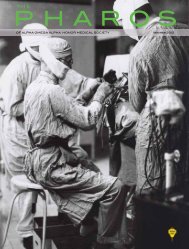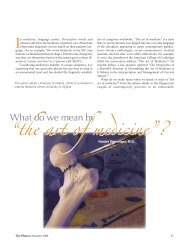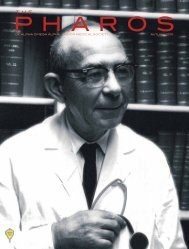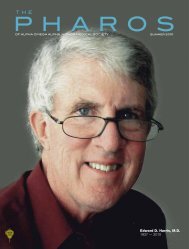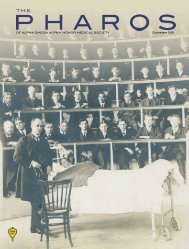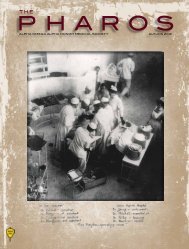Download The Pharos Winter 2008 Edition - Alpha Omega Alpha
Download The Pharos Winter 2008 Edition - Alpha Omega Alpha
Download The Pharos Winter 2008 Edition - Alpha Omega Alpha
Create successful ePaper yourself
Turn your PDF publications into a flip-book with our unique Google optimized e-Paper software.
Reviews and reflections<br />
David A. Bennahum, MD, and Jack Coulehan, MD, Book Review Editors<br />
Happy Accidents: Serendipity<br />
in Modern Medical<br />
Breakthroughs<br />
Morton A. Meyers<br />
Arcade Publishing, New York, 2007,<br />
390 pages<br />
Reviewed by Robert H. Moser, MD<br />
(AΩA, Georgetown University, 1969)<br />
Serendipitous discoverers have certain<br />
traits in common. <strong>The</strong>y have<br />
passionate intensity. <strong>The</strong>y insist on<br />
trying to see beyond their own and<br />
others’ expectations and resist any<br />
pressure that would close off investigation.<br />
Successful medical discoverers<br />
let nothing stand in their way.<br />
<strong>The</strong>y break through, sidestep, or<br />
ignore any obstacle or objection to<br />
their chosen course, which is simply<br />
to follow the evidence wherever it<br />
leads. <strong>The</strong>y have no patience with<br />
dogma of any kind. p314<br />
This is the principal message of this<br />
splendid book that for me struck<br />
a sharp note of déjà vu. Many years<br />
ago in conversation with that magnificent<br />
intellect Alvin Feinstein, I used<br />
almost the same words to describe what<br />
I called “the Intellectual Imperative,”<br />
but I was speaking of all scientific<br />
endeavor and its creative<br />
disciples.<br />
Later the author offers<br />
this observation,<br />
as a qualifying<br />
corollary to his<br />
principal thesis—and in seeming paradox.<br />
Despite all the examples given, mainstream<br />
medical research stubbornly<br />
continues to assume that new drugs,<br />
and other advances, will follow exclusively<br />
from a predetermined research<br />
path. Many, in fact will. Others, if<br />
history is any indication, will not.<br />
<strong>The</strong>y will not come from a committee<br />
or a research team but from an<br />
individual, a maverick who views the<br />
problem with fresh eyes. Serendipity<br />
will strike and be seized upon by<br />
a well-trained scientist or clinician<br />
who also dares to rely on intuition,<br />
imagination and creativity. p315<br />
But this issue is quite complex. <strong>The</strong><br />
author makes frequent reference to the<br />
stultifying atmosphere of most contemporary<br />
“organized research” beset<br />
with the bureaucratic realities of seeking<br />
grant money, pursuing the party-line,<br />
team effort at “goal oriented” research,<br />
and enduring formidable peer review by<br />
referees (often intellectually myopic or<br />
hostile). This is the eternal lament about<br />
<strong>The</strong> Establishment with its built-in resistance<br />
to new, innovative ideas, especially<br />
if they are iconoclastic and challenging<br />
to the “prevailing wisdom.” It has almost<br />
become a tiresome truism.<br />
In reality, most of the Eureka! moments<br />
described in this book came from<br />
science- disciplined “plodders” laboring<br />
in the vineyards of the establishment,<br />
but blessed with the brilliance and virtuosity<br />
to recognize the serendipitous<br />
thunderbolt when it struck. I believe<br />
it takes a disciplined scientific mind to<br />
appreciate this grand event. But I am<br />
also convinced that there should be<br />
research funds dedicated to encourage<br />
those rare individuals who come<br />
up with the revolutionary idea, quite<br />
outside the mainstream, to enable them<br />
to pursue their heart’s desire. I feel that<br />
medicine has learned enough from the<br />
historical contribution of serendipity to<br />
allow the occasional brilliant maverick<br />
some free rein.<br />
Also, I have always felt (as expressed<br />
in Meyers’s earlier statement) that the<br />
intellectual imperative of the “iconoclast”<br />
will ultimately prevail, and the<br />
scientific community, after perhaps initial<br />
reluctance—especially if the idea<br />
borders on the bizarre—will review the<br />
data. If it bears up under steely- eyed<br />
scrutiny, it will be embraced. Alas, for<br />
each serendipitous Eureka! there are<br />
many others that are simply useless,<br />
off-the-wall concepts. It is an obligation<br />
of <strong>The</strong> Establishment to assess these as<br />
well. And this latter group is often quite<br />
vociferous in condemning the perceived<br />
stone-walling they encounter from the<br />
established scientific discipline. I really<br />
don’t believe that very many truly worthy<br />
new medical ideas have been sacrificed<br />
by this methodology. I will concede<br />
some unfortunate delay and much frustration<br />
by some worthwhile (even Nobel<br />
laureate- quality) innovators, but new<br />
concepts must pass rigorous muster; the<br />
process isn’t perfect, but it is the best we<br />
can do. Perfection is an elusive ideal.<br />
Also I cannot agree with the author<br />
that “Eventually, once the breakthrough<br />
becomes part of accepted medical wisdom,<br />
the insiders will pretend that the<br />
outsider was one of them all along.” p25<br />
This is unduly cynical. Most of the “outsiders”<br />
were disciplined “insiders” before<br />
their great moment. As Pasteur<br />
said, “Chance favors only the prepared<br />
mind.” p27<br />
Aside from a rather tiresome repetition<br />
of the issues stated above, and<br />
too- frequent references to the reluctance<br />
of some discoverers to admit the<br />
serendipitous nature of their discovery,<br />
the book is an absorbing read. Meyers is<br />
a wonderful storyteller. He has explored<br />
letters, texts, articles, and other materials<br />
to provide a series of fascinating<br />
anecdotal chapters of medical history<br />
that we all know about, superficially. In<br />
this exciting book he provides details<br />
that were previously unknown to me;<br />
they bring the historic events to brilliant,<br />
vibrant life.<br />
He begins with infectious diseases<br />
and how they unfolded (Leeuwenhoek,<br />
42 <strong>The</strong> <strong>Pharos</strong>/<strong>Winter</strong> <strong>2008</strong>




